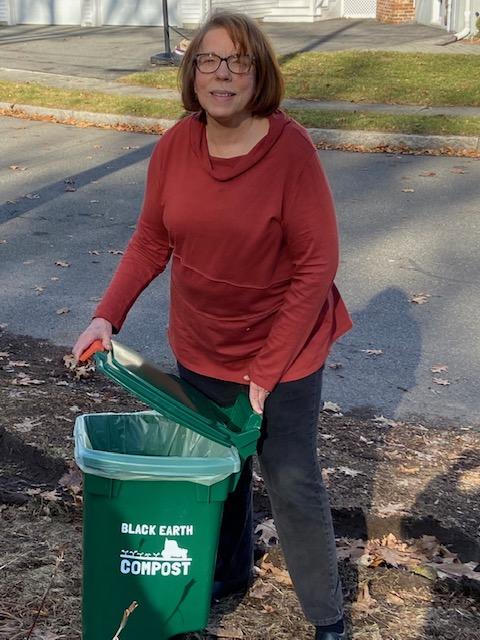Yes, those food scraps—vegetable peels, coffee grounds, eggshells, and more—are too good to waste
To celebrate growing season, Food Waste Prevention Week, and Earth Day (April 22), try composting them instead! Nature will turn them into nutrient-rich soil for growing more food.
Reading offers two great options for composting: via curbside pickup or in the backyard.
Sign up with Black Earth Compost (blackearthcompost.com) for weekly or biweekly pickup and get a free starter kit from Reading’s DPW (a bin and a roll of compostable bags, worth about $35). Special Earth Day sale from 4/11 to 4/30: 15% off your new subscription (code EARTHDAY25)!

Or order an Earth Machine backyard bin from the DPW (https://www.readingma.gov/820/Home-Compost-Bin) and get an instant $21 rebate—your cost $30.
Susan Bowe, a member of Reading Composts! (a Reading volunteer group that encourages and supports food-waste composting), is an enthusiastic composter. “Food composting with Black Earth works easily for my family.,” Susan reports. “We have a countertop container inside and the BEC container just outside on our porch. We’ve never had issues with animals trying to open it. “
“It’s easy to add and pay for bag liners on my BEC account,” she notes. “They drop them off when collecting our compost on Thursday.”
“We’re psyched when hauling the bin to the curb, realizing the weight will turn into healthy soil and not hard-to-handle ash from an incinerator. And I can compost meat, bones, shells and other items I can’t put in a backyard bin.”
The Reading Public Schools have also caught the food-waste composting wave. Susan says, “I’m pleased that Reading will soon have food composting in school food prep as well as student lunch cleanup. It’s the kids’ future and I’m hopeful that when they learn the benefits of food composting, they’ll encourage their family to compost either with BEC or in their backyard.“
Mike Moscardini, a Reading resident and Black Earth subscriber, adds, “My trash barrels are much cleaner and don’t really smell anymore. And somehow my compost barrel doesn’t smell as bad as my trash used to.”
Why compost food scraps?
- Diverting them lowers what Reading pays by ton to dump trash at the incinerator. Food scraps are heavy!—by weight, 25% to 40% of the waste stream.
- Compost improves soil health. Whether in your yard or on a farm, it increases moisture retention, microbial activity, soil fertility, disease suppression, and the soil’s ability to store nutrients.
- Compost in soil improves ecological health—it sequesters CO2 from the atmosphere.
- It builds a more resilient MA! We have a local source of nutrients for growing healthy food without chemical fertilizers. And MA depends less on disposing of trash in other states and has more green jobs.
Consider joining in! “All life above the soil is dependent on life within the soil” (Black Earth Compost).
